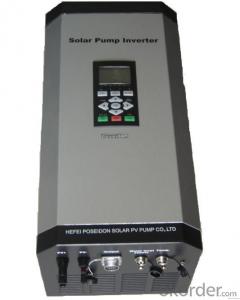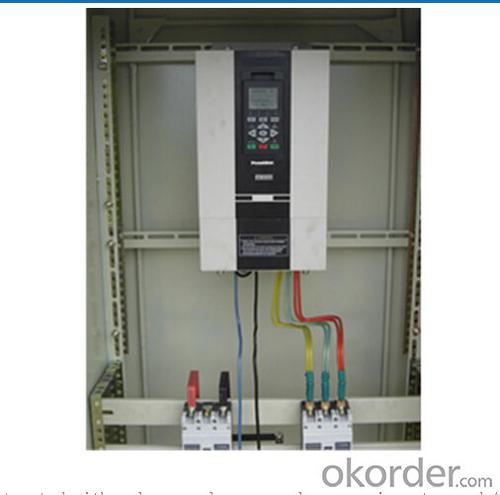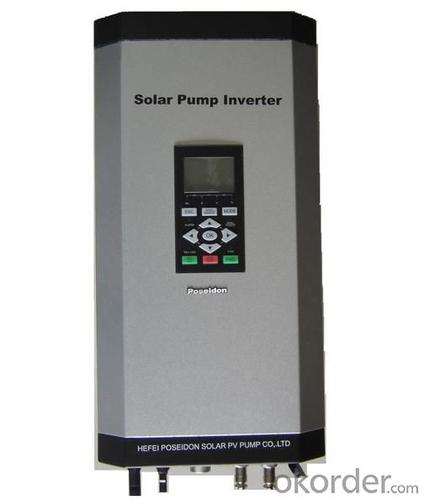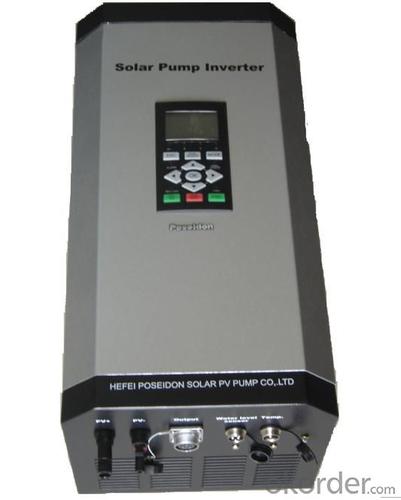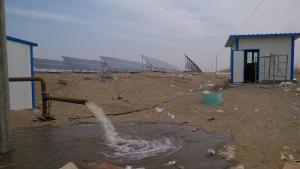Solar Pump for Well FCPM55KH Inverter
- Loading Port:
- China Main Port
- Payment Terms:
- TT OR LC
- Min Order Qty:
- -
- Supply Capability:
- -
OKorder Service Pledge
Quality Product, Order Online Tracking, Timely Delivery
OKorder Financial Service
Credit Rating, Credit Services, Credit Purchasing
You Might Also Like
Solar pump inverter FCPM55KH Product Description:
Solar water pumping system is constructed with solar panel array,solar pump inverter and AC water pump, DC current produced from solar panel will be delivered to solar pump inverter,and it will convert it into AC current to drive water pump,and will automatically regulate output frequency according to sun radiance intensity,maximally realize MPPT tracking function.
Features
Adopting the proposed dynamic VI maximum power point tracking (MPPT) control method, with fast response, and reliable operation, achieves efficiency of 99%.
Designed with variable frequency driver, greatly improves efficiency
Extremely high efficiency
Digital mode control, with automatic operation and manual operation mode options
Complete protection functions
Adopts intelligent IPM module, with high reliability
LCD display and operation panel, in real time presents operating data
Optional for water level measurement and control circuit
Applicable for general ACC pumps, like centrifugal pump, piston pump etc.
Independent intellectual property; Highly effective, the redundant reliability, exempts the maintenance and the long life.
The pumps are soft started, fully protected.
No batteries are used. So better Sunlight, more water.
Datasheet.
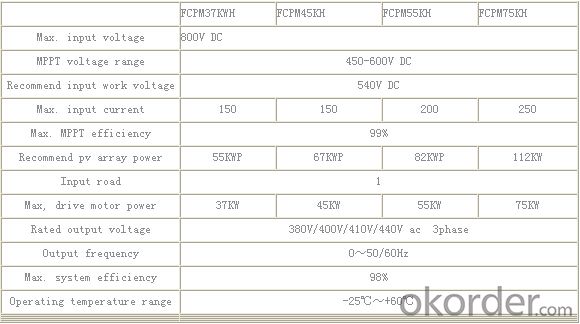
- Q: Can a solar pump be used in areas with limited access to skilled labor for repairs?
- Yes, a solar pump can be used in areas with limited access to skilled labor for repairs. Solar pumps are typically designed to be low maintenance and durable, requiring minimal repairs. They are built with reliable technology and often have long lifespans, reducing the need for frequent repairs. Additionally, solar pumps have fewer moving parts compared to traditional pumps, making them simpler to operate and maintain. This makes them suitable for remote areas where skilled labor may be scarce, allowing communities to have access to a sustainable and reliable water source without relying heavily on repair services.
- Q: Are solar pumps weatherproof?
- Solar pumps are indeed weatherproof. They have been engineered to endure diverse weather conditions, such as rain, snow, and extreme temperatures. Typically, they are constructed using sturdy materials that resist corrosion and UV radiation. Moreover, they often come with protective covers or casings to safeguard the internal components against moisture and other environmental elements. This impeccable weatherproof design guarantees the efficient and dependable operation of solar pumps in any outdoor environment, making them ideal for a variety of uses, such as irrigation, water supply, and fountain systems.
- Q: Can a solar pump be used in areas with high altitude?
- Certainly! A solar pump is suitable for use in high-altitude areas. Its operation relies on capturing solar energy and converting it into power for water pumping. The key determinant of a solar pump's efficiency is the amount of sunlight it receives, rather than the altitude of the location. Nevertheless, it is crucial to take into account the impact of altitude on the performance of solar panels. In regions with higher altitudes, the air tends to be thinner, resulting in reduced atmospheric filtration of sunlight. Consequently, this can enhance the efficiency of solar panels by allowing more sunlight to reach them. However, it is also important to consider the temperature fluctuations that occur at higher altitudes, as extreme cold weather can affect the performance of the pump's components. To ensure optimal performance and durability, it is advisable to select a solar pump specifically designed for high-altitude environments. In summary, using a solar pump in high-altitude areas is feasible, but it is essential to consider the specific conditions and choose the appropriate equipment accordingly.
- Q: What is the expected efficiency of a solar pump system in converting solar energy to mechanical energy?
- The expected efficiency of a solar pump system in converting solar energy to mechanical energy can vary depending on various factors such as the type and quality of the solar panels, the design of the pump system, and environmental conditions. However, on average, solar pump systems can achieve an efficiency of around 20-30%.
- Q: On the issue of pumps and solar panels
- Pump head and power sure and pump power and methods such as centrifugal pumps ~ but this full business can give you recommended.
- Q: How much water can a solar pump produce?
- The amount of water a solar pump can produce depends on the size and efficiency of the pump, as well as the amount of sunlight available. Generally, solar pumps can produce anywhere from a few hundred liters to several thousand liters of water per day.
- Q: How long does it take to recoup the cost of a solar pump through energy savings?
- The length of time it takes to recoup the cost of a solar pump through energy savings depends on various factors. These factors include the initial cost of the solar pump, the amount of energy savings achieved, the cost of electricity in your area, and the usage pattern of the pump. Typically, solar pumps have a higher upfront cost compared to traditional pumps. However, they offer significant energy savings over time as they rely on solar energy rather than electricity from the grid. Solar pumps are designed to generate their own power through photovoltaic panels, thus reducing or eliminating the need for electricity consumption. To determine the payback period, you need to calculate the difference in energy costs between using a solar pump and a traditional pump. Subtract the annual energy cost of a traditional pump from the annual energy cost of a solar pump to determine the annual energy savings. Then divide the initial cost of the solar pump by the annual energy savings to find out how many years it will take to recoup the cost. For example, if the initial cost of a solar pump is $5,000 and it offers an annual energy savings of $1,000 compared to a traditional pump, the payback period would be 5 years ($5,000 / $1,000 = 5). This means that after 5 years of using the solar pump, the energy savings would have covered the initial cost. It's important to note that these calculations are estimates and the actual payback period may vary depending on the specific circumstances. Additionally, there may be other factors to consider such as maintenance costs and potential government incentives or tax credits that can further reduce the payback period. Overall, investing in a solar pump can provide long-term energy savings and contribute to a more sustainable and eco-friendly way of pumping water.
- Q: Can a solar pump be used for water supply in commercial buildings or complexes?
- Certainly, water supply in commercial buildings or complexes can be effectively achieved using a solar pump. These pumps offer a sustainable and cost-effective alternative to traditional electric pumps in such settings. By utilizing solar energy to power the pump and extracting water from wells, boreholes, or other sources, they eliminate the need for electricity and decrease operational expenses. Solar pumps possess the capability to meet the water demand of commercial buildings or complexes. They can be utilized for a variety of water-related purposes, such as irrigation, plumbing, and water circulation systems. Advancements in solar technology have made these pumps more efficient, enabling them to deliver water at high pressures and flow rates, making them suitable for even large-scale water supply needs. Moreover, solar pumps are environmentally friendly as they function on renewable energy, resulting in reduced carbon emissions and reduced reliance on fossil fuels. They also require minimal upkeep and have a long lifespan, ultimately leading to lower overall operational costs. In summary, a solar pump is a viable and sustainable choice for water supply in commercial buildings or complexes. Its ability to harness solar energy makes it an ideal option for those who aim to decrease energy consumption and promote environmental sustainability.
- Q: Can a solar pump be used in a well?
- Yes, a solar pump can be used in a well. Solar pumps are designed to operate using solar energy, which makes them an excellent choice for remote locations where traditional power sources are not readily available. The pump uses solar panels to convert sunlight into electricity, which powers the pump to draw water from the well. Solar pumps are typically low maintenance, cost-effective, and environmentally friendly, making them a popular option for well owners looking for a sustainable and reliable water pumping solution.
- Q: Are solar pumps noisy during operation?
- No, solar pumps are not noisy during operation. They usually operate silently, making them ideal for both residential and commercial settings.
Send your message to us
Solar Pump for Well FCPM55KH Inverter
- Loading Port:
- China Main Port
- Payment Terms:
- TT OR LC
- Min Order Qty:
- -
- Supply Capability:
- -
OKorder Service Pledge
Quality Product, Order Online Tracking, Timely Delivery
OKorder Financial Service
Credit Rating, Credit Services, Credit Purchasing
Similar products
Hot products
Hot Searches
Related keywords


